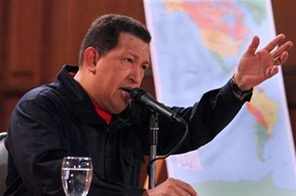Chavez attacks US plan
SAN JOSE: Venezuelan President Hugo Chavez denounced a U.S.-backed effort to ease Honduras' coup crisis on Friday as a second day of negotiations ended without a deal between rival contenders for the presidency.
The mediator of the talks, Costa Rican President Oscar Arias, said the sides representing ousted Honduran President Manuela Zelaya and de facto leader Roberto Micheletti have agreed to continue talks at an undetermined future date.
While the talks have the support of most of the world community, some leftist leaders object to giving Micheletti the same treatment as Zelaya.
The talks "became a trap that set a very grave precedent," Chavez told a news conference in Caracas.
"How horrible to see a legitimate president receiving a usurper and giving him the same treatment," Chavez said, referring to Arias' Thursday night with Micheletti, the congressional leader who was sworn in as president when the military threw Zelaya out of the country on June 28.
Chavez said Micheletti should have been arrested in Costa Rica and that the United States should be putting more pressure on Honduras to return Zelaya to power.
"Why haven't they recalled their ambassador to Honduras? Why haven't they supported sanctions? Economic sanctions? Political sanctions? There have been timid measures."
Chavez said he spoke to the top U.S. diplomat for the Americas, Thomas Shannon, by telephone for a half hour on Thursday to express his opinion on the matter.
"They have a military base. Why don't they start some movements there at the military base?" Chavez said. "Or withdraw all their troops? ... Something. Do something. Obama, do something."
In Honduras, Micheletti brushed off Chavez's harsh criticism and calls for action against his government.
Chavez "said he was going to invade and he didn't invade us. He said he was going to hold back fuel to Honduras and he didn't. He said he was going to bring Manuel Zelaya back one day and he didn't. Hugo Chavez is losing credibility in the world," Micheletti said.
Arias, who won the 1987 Nobel Peace Prize for his role in ending Central America's civil wars, asked that outside critics of the talks "let Central Americans solve the problems of Central America like we did 20 years ago."
U.S. officials have promoted the talks in Costa Rica's capital, hoping to ease Zelaya back into the presidency without violence while resolving the concerns of Honduras' Supreme Court, Congress and military, which say they legally removed the president for violating the constitution by maneuvering to extend his time in power.
State Department spokesman P.J. Crowley said Friday the pace of negotiations will be set by Arias but that U.S. officials would continue consultations and would work "within the OAS in the coming days to see if we can't help President Arias create momentum that leads to a peaceful resolution of this."
U.S. mediation at least briefly overshadowed Chavez's more belligerent crusade to have his ally Zelaya returned to power.
The United Nations and Organization of American States — including the Obama administration — have demanded that Zelaya be returned to power so he can serve out a term that end in January. No foreign government has recognized Micheletti.
Arias met both Honduran leaders on Thursday, but failed to convince them to talk together. Each continues to insist that the other give up claims to lead the country.
Friday's talks between Arias' team and delegations representing Zelaya and Micheletti — but lacking the leaders themselves — ended without an announced breakthrough.
"In the coming days we will announce the date for the next round" of talks, said Arias. "It is not viable that a conflict this deep could be solved in one meeting."
Silvia Ayala, a leftist lawmaker with Zelaya's delegations, said the sides agreed to let Arias set the date for future talks, but urged that they be held soon "because the country can't support weeks of this intolerance."
Former Honduran Foreign Minister Carlos Lopez, of the Micheletti delegation, said his side hasn't ruled out the possibility of early elections as a way out of the crisis.
A new CID-Gallup poll indicated that Hondurans were split on the coup, with a slight majority appearing to oppose it.
Forty-six percent said they disagreed with Zelaya's ouster and 41 percent said they approved of it, according to the face-to-face survey of 1,204 Hondurans in the days following the ouster. Another 13 percent declined to answer.
They were about evenly divided on Zelaya himself, with 31 percent saying they had a positive image of him and 32 percent negative. That was close to findings of a similar poll four months ago in which positive views outpaced negative by 4 percentage points.
The pollsters said the survey, conducted in 16 of Honduras' 18 provinces from June 30 to July 4, had a margin of error of 2.8 percentage points.
Zelaya, meanwhile, flew to the Dominican Republic, where President Leonel Fernandez received him with full military honors and promised to speak for Zelaya at the upcoming summit of the Nonaligned Movement in Egypt.
Thousands of Zelaya supporters blocked a road and burned tires in the Honduran capital of Tegucigalpa on Friday, but there were no reported clashes with troops or police.
Chavez said that Zelaya was still seeking to enter Honduras, despite a thwarted previous attempt in which his plane was not allowed to land. Micheletti has said he would arrest Zelaya if he returned.
"Zelaya is going to enter. He's determined to enter" Honduras, Chavez said. "I don't know where, whether by water, by air or by land. But Zelaya is going to enter Honduras."
Chavez also read a note from his mentor Fidel Castro, saying the Cuban leader told him: "Chavez, that meeting in Costa Rica is opening the door for a coming wave of coups in Latin America."






